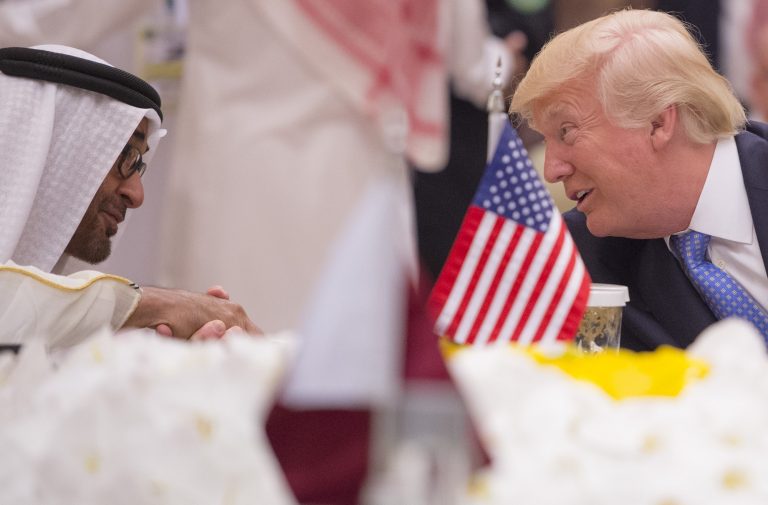
Image by Bandar Algaloud/Getty Images, © All Rights Reserved.
Ten Things I’m Pondering as the President Visits the Middle East
President Donald Trump, facing a serious legal investigation about his ties with Russia, is taking a multi-country trip to the Middle East and Europe. This trip is highlighted by visits to three countries, featuring the holy centers for Muslims, Christians, and Jews.
President Trump’s tone in Saudi Arabia and Israel has been more calm, measured, a noted departure from the bombastic nature of both his campaign and his first hundred days in office. The breathless coverage and analysis has been largely positive, but there are a few important points that still need to be made:
1) Which Trump?
The Trump that we saw during the presidential election famously stated “Islam hates us.” In Saudi Arabia, surrounded by the heads of many Muslim states, Trump instead referred to Islam as one of the “world’s great faiths.” One simply wonders which Trump to believe or for that matter whether President Trump actually believes any of these. This smacks of political opportunism, a man who lacks the courage of his own convictions or is at least willing to subjugate them in light of business interests (see below).
2) Peace, Security, and Weapons
President Trump’s speech was filled with references to peace and security, yet the context of his visit was one of the largest arms sales in the history of the United States: a $110 billion weapons sale to Saudi Arabia. Saudi Arabia has been waging a brutal war against Yemen and is escalating tensions against Iran. One does not purchase over a hundred billion dollars of weapons to store them or to beat them into plowshares. There is something more than ironic about speaking of peace and security while also weaponizing the most unstable part of our shared world.
3) There Is No ‘Muslim World’
President Trump presented his speech as visiting the “heart of the Muslim world.” Muslims, like Christians, represent a global community. There is no “Christian world,” there is no “Jewish world,” and there is no “Muslim world.” The Muslim world represents a racialized and homogenized entity that has much more to do with Euro-American imaginations, as the recent book by Professor Cemil Aydin and Atlantic article by Professor Zareena Grewal both document.
President Trump continues to speak of Muslims as living in this “other” world, somewhere over there. In the words of Zareena Grewal, it is as if “Islam is a foreign country.” The truth of the matter is that there is one world, a small, deeply interconnected world that we, all of us, share.
Trump’s words about Islam also mask the existence of Muslims here in America since before there was an “America.” There were Muslims on Columbus’ ships, and there were hundreds of thousands of Muslims among the stolen West-African human beings who were enslaved and brought to the New World. Even today, the single largest group of Muslim Americans are African Americans. President Trump does not refer to them, since the notion of Muslim Americans who have been in America since before Trump’s own family migrated to America would disturb and unsettle his binary view of Islam and America being mutually exclusive categories.
4) Radical Islamic Terrorism / Islamic Extremism
In the inauguration speech, President Trump spoke of “radical Islamic terrorism”: “We will reinforce old alliances and form new ones and unite the civilized world against radical Islamic terrorism, which we will eradicate from the face of the Earth.”
In Saudi Arabia, Trump chose his words more carefully, instead speaking of a “new Global Center for Combating Extremist Ideology.” To speak of “extremist ideology” rather than “Islamic terrorism” carries obvious tones.
Only once in the Saudi Arabia speech did President Trump link together Islam and extremism, after having spent years blasting the Obama administration for not more deliberately linking those together: “That means honestly confronting the crisis of Islamist extremism and the Islamist terror groups it inspires.”
If the distinction between “Islamic extremism” and “Islamist extremism” is to be taken seriously, it actually would carry enormous consequences for U.S. foreign policy. “Islamist,” meaning political parties that seek to introduce an understanding of Islam into the public arena, covers a vast network of political parties across the political spectrum. If President Trump intends to label all of them as “extremist,” that would put the United States at odds with many Muslim countries at once.
If one operates from the point of view that all human life is sacred, it is important to note that the majority of loss of human life comes not at the hands of “terrorist” organizations, but rather state entities. It is the role of nation states — including the United States — that has to be interrogated in any discussion of violence and extremism.
5) Hypocrisy Regarding Refugees
In the speech in Saudi Arabia, President Trump famously said: “This region should not be a place from which refugees flee, but to which newcomers flock.” One would almost be excused to believe that Trump is concerned about the plight of the refugees. Is this the same person who campaigned to demonize refugees, again and again equating them with terrorism? Is this the same president who attempted — and failed — to pass not one but two Muslim bans?
6) Saudi Arabia Is Not the Heart of the “Muslim World”
While Muslims do, following the words of the Prophet Muhammad, at times speak of themselves as a body (Christians also speak of the Church as a body), this metaphor is one that is intended to talk about the importance of sympathy and empathy among the faithful. But Saudi Arabia is not the “heart” of the Muslim community. The Muslim “world” doesn’t have a heart, eyes, brain, or butt cheeks. Mecca, Medina, and Jerusalem are sacred to all Muslims but not so modern nation states. All modern nation states are creations that came to exist in the 18th, 19th, and 20th centuries, well after the time of Jewish, Christian, and Muslim revelations. Whereas Mecca, Medina, and Jerusalem all contain sites sacred to all Muslims, to sacralize an entire nation state (whether Saudi Arabia, the United States, Pakistan, Iran, India, Israel, or any other) is dangerous, irresponsible, and historically anachronistic.
Furthermore, for many Muslims, the crass commercialism of the holy sites in Mecca and Medina, the sub-human treatment of many immigrants, the puritanical Wahhabi teachings, and the destruction of almost 90 percent of sacred and historical sites in Mecca while building monstrous luxury hotels and shopping centers and more lead them to see Saudi Arabia not as the heart of the Muslim world but as something profoundly problematic.
7) Which America?
It is not only President Trump’s discourse on Islam that is changed, but so too is his notion of America. In this occasion, Trump stated, “America will not seek to impose our way of life on others, but to outstretch our hands in the spirit of cooperation and trust.” In his inauguration, on the other hand, Trump famously championed an “America first” mentality (“From this day forward, it’s going to be only America first.”) Which Trump are we to believe?
Here is the simple and fundamental challenge: If, as President Trump stated in the inauguration, “we do so with the understanding that it is the right of all nations to put their own interests first,” how are we to have world peace? By definition, we cannot all be first. If India is trying to be first, and China is trying to be first, and, of course, America is trying to be first, we are going to have a clash. World peace necessitates not a “me first” mentality but a principle of justice and harmony.
8) Militancy Against Islam
President Trump named so many of the great civilizations of the Middle East region: Egypt, Iraq, Saudi Arabia, and the U.A.E. Missing from this list was a significant omission: Iran. Whatever Trump thinks of the current Iranian regime (more on that soon), there is little reason to deny Iran (and its older name, Persia) its rightful place among the great empires in history. Iran is a nation with 5,000 years of history and 2,500 years of recorded history. Along with China, India, Greece, and Rome, Iran was among the great empires of history. Yet Trump is so bent on demonizing the current Iranian government that his animosity is projected back to millennia of history.
Likewise, President Trump sees Iran as the key factor behind the instability in the region, conveniently foregoing the role of authoritarian regimes, usually backed by the United States (Iran itself during the time of the Shah, Pakistan, Saudi Arabia, and Egypt, just to name a few). Even when Trump names Iran as complicit in the atrocities of Syria (“Among Iran’s most tragic and destabilizing interventions have been in Syria”), he conveniently leaves out the role of Russia, which has been following the very same policies as Iran. But Trump will not risk antagonizing Russia by mentioning them. His comments are rooted more in partisan warmongering than informed analysis.
9) Do Words Have Meaning?
“In an enterprise as cynical as this one, it seems to matter hardly at all. Love is hate, north is south, peace is war.”
Unless the meaning of words is completely dissociated from them, how is one to read “Above all, America seeks peace, not war”? How can this be when the United States spends more on their military than the next 12 countries combined? How can this be when we alone keep military bases on he soil of more than a hundred other countries? How can this be when we are currently droning Muslims to death in seven different countries?
Or is it that the words “peace” and “war” no longer have any meaning?
10) Peace in the Palestine/Israel Conflict
President Trump has confidently stated that finding peace between Palestinians and Israelis may not be as hard as many others have posited. He is right about this element: it is not rocket science. It’s about the occupation. The world community recognizes the occupation of the West Bank (and de facto occupation of Gaza) as illegal and unjust. It is meaningless to speak of a peaceful solution when there are hundreds of thousands of illegal Jewish settlers in the West Bank. The whole talk of a two-state solution is meaningless when there is no contiguous state left for the future Palestinian state.
The key factors are known to all: borders of the future states, right of refugees to return, the fate of Jerusalem, equal rights for all under the law, the illegal settlements, security for both Israelis and Palestinians, etc. When the United States is arming Israel at a rate of billions of dollars a year and providing blanket immunity at the Security Council it is hollow beyond belief to speak of achieving peace in this conflict.
One has to be grateful for the change in President Trump’s tone. Words matter; tones matter. Yet one hopes that the reality behind words is also addressed so that our policies actually match the discourse of peace, justice, and security.

